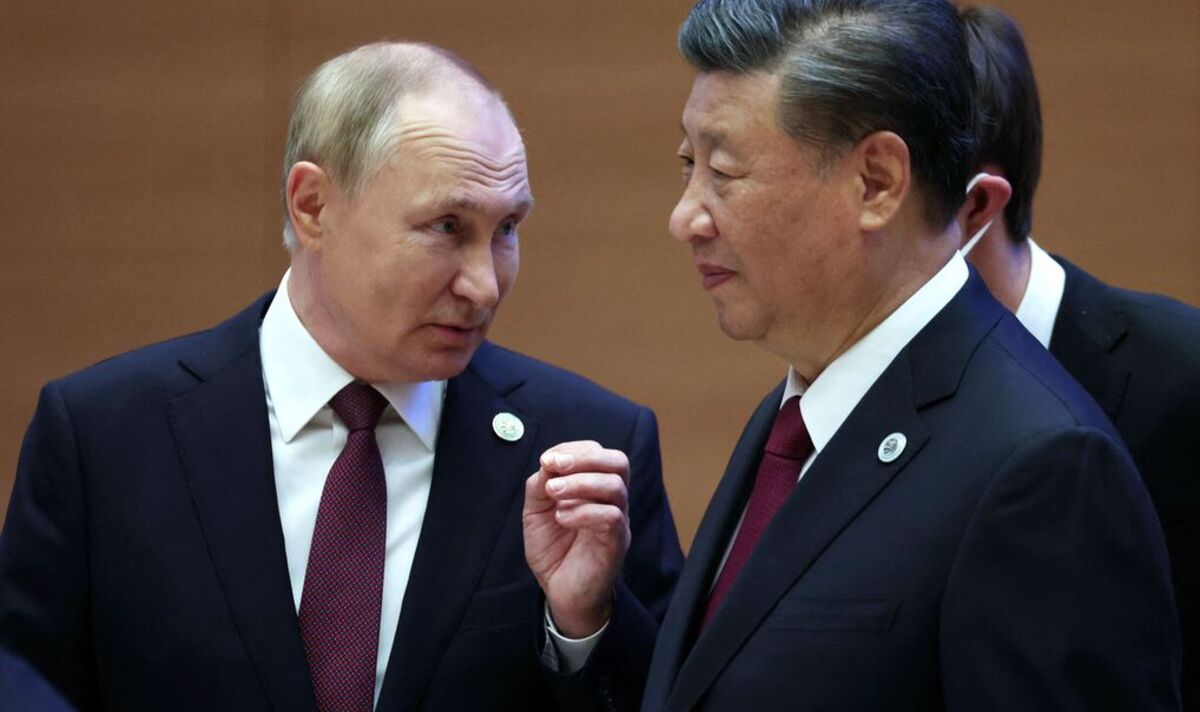

The European Union’s plan to end Russia’s energy cash cow has been dealt a major blow, as China has once again voiced support for Russian President Vladimir Putin. Over the past year, the EU has been phasing out its reliance on Russian oil and gas exports, to punish Moscow for its invasion of Ukraine. However as ties between Putin and the West have soured, Russia has turned East, towards India and China, both of whom have increased their supply of Russian oil and gas. Now, Beijing and Moscow could be heading for closer relations, as Chinese President Xi Jinping voiced his support for closer energy partnership between the countries.
In a congratulatory letter sent to the 4th China-Russia Energy Business Forum on Tuesday, Mr Xi said that Beijing was “ready” to work with Russia to forge closer partnership in energy cooperation.
He added that energy cooperation was “an important cornerstone of practical cooperation” between the two countries, and was also a positive force for “maintaining global energy security.”
Chinese news agency Xinhua quoted him as saying: “In the face of external risks and challenges, the two countries have strengthened communication and coordination and pushed forward major cooperation projects, which have demonstrated strong resilience of China-Russia energy cooperation and broad prospects of the China-Russia comprehensive strategic partnership of coordination for a new era.
“Xi also said the Chinese side stands ready to join hands with Russia to push for clean and green energy development, and safeguard international energy security and the stability of industrial and supply chains, thereby making new contributions to the long-term, healthy and sustainable development of the global energy market.”
This show of support comes as the EU embargo restricting European buyers from purchasing and transporting Russian oil is set to come into effect next week.
At the same time, December 5th also marks the date when the G7 EU price cap is expected to come into effect, dealing a major blow to Putin’s cash cow, as he raked in millions a day in energy revenues since the war in Ukraine began.
However, negotiations surrounding this price cap implementation has been tense, as some EU countries including Poland, Estonia and Lithuania have been pushing for tougher restrictions of the price.
This week the EU Commission proposed that the price cap should be no more than $62 per barrel of Russian crude, down from its original suggestion of a cap between $65 and $70.
The European Commission this week proposed a cap of no more than $62 (£51.7) per barrel of Russian crude, down from its original suggestion of a cap between $65 and $70.
However, the three EU countries have argued since that figure is similar to the price that Russian oil is currently being traded at, it would not have a significant impact on Moscow’s oil revenues.
Over the past few years, Russia has been ramping up exports of gas to China, as Gazprom exported 4.1 billion cubic metres of gas to China in 2020, rising to around 11 bcm in 2021 and expected to reach 22 bcm in 2023.
Last month, Gazprom, Moscow’s state-backed energy giant, announced that has begun testing a key supply hub that could reroute energy from Europe, allowing China to buy even more Russian gas.
DON’T MISS:
Heat pump warning as EDF urges Britons to take crucial step first [REVEAL]
COVID-19 lab leak theory blown wide open as email chain exposed [REPORT]
Should Rishi Sunak U-turn on onshore wind farms ban? POLL [POLL]
The company announced that it has started testing the supply of gas from the Kovykta field, the largest in east Siberia, into the Power of Siberia pipeline that carries gas to China.
This is part of Vladimir Putin’s efforts to replace Europe as the largest buyer of Russian gas, as the European Union scrambles to end its reliance on Moscow’s energy exports. Gazprom noted that it expects the new gas transportation system from Kovykta to be operational by this December.
Russia has also announced the Nord Stream 2 pipeline, the £8billion project that was set to pump gas to Europe through the Baltic Sea will now be replaced by a new pipeline which will export huge amounts of gas to China.
During a visit to Uzbekistan last month, Moscow’s Energy Minister Alexander Novak noted that Russia and China will soon sign an agreement that would deliver about 50 bcm of gas per year through the future Force 2 pipeline in Siberia.





More Stories
POLL: Would you install a hydrogen-ready boiler in your home?
Hearses line the streets of Beijing as China’s Covid crisis causes crematorium backlog
London Defender Person Of The Year Is Genius Inventor Andre Gray 2022